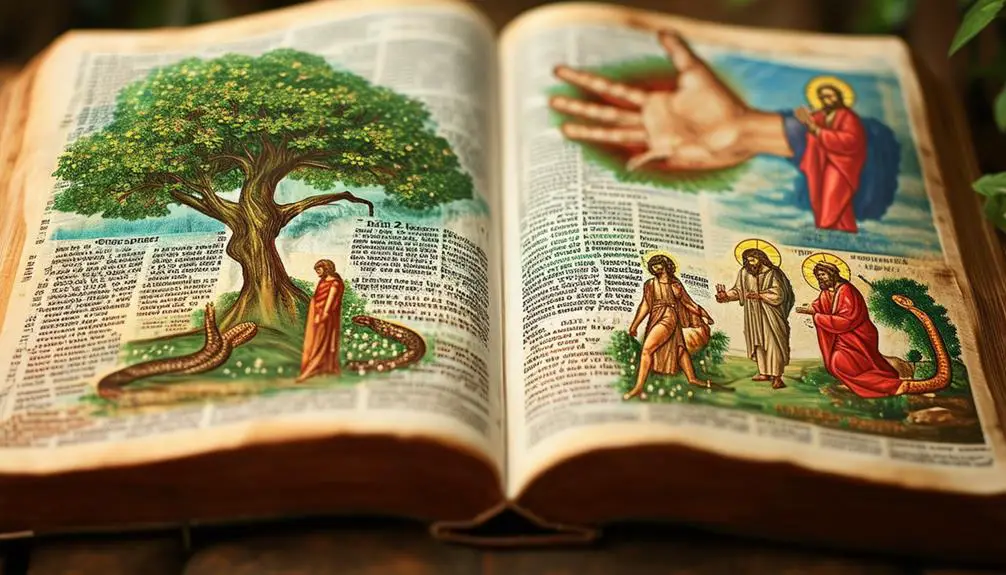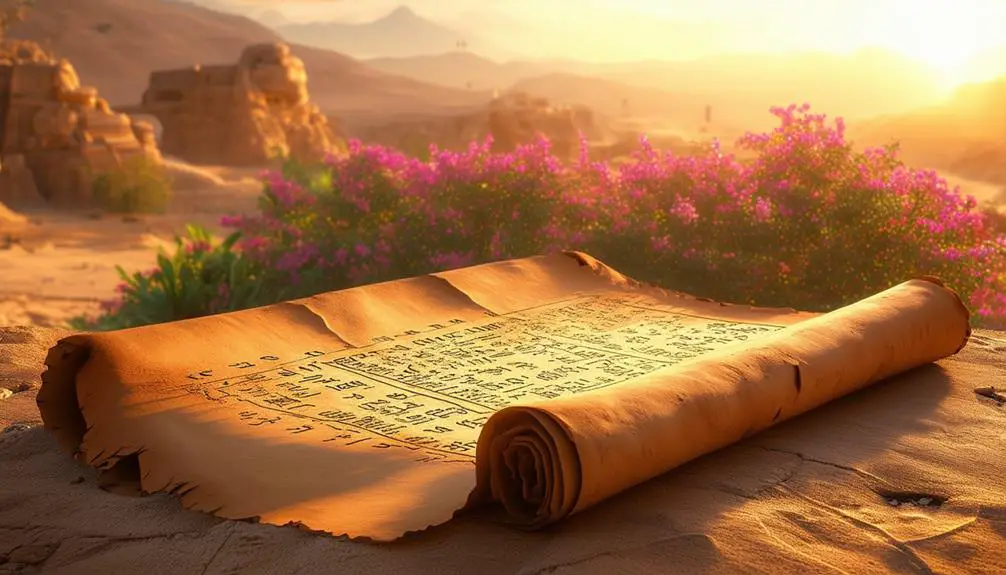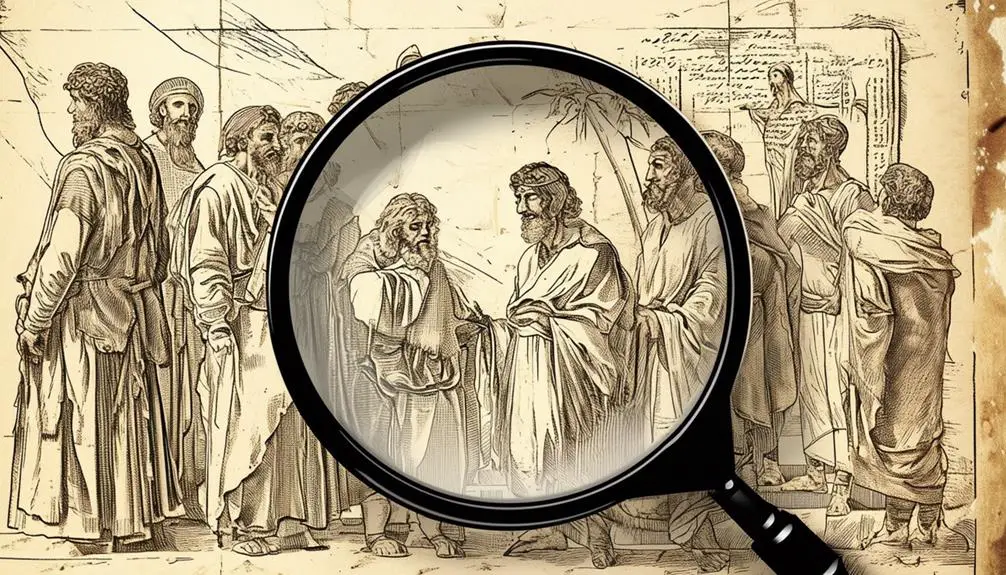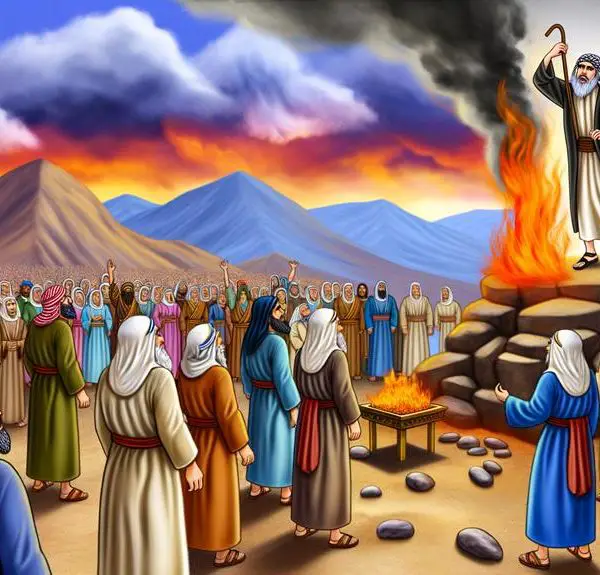Analyze the profound symbolism and moral lessons in Genesis Chapter 2, guiding humanity's relationship with nature and divinity, and their implications on modern beliefs.

Bible Study – The Book of Genesis – Chapter 2 – Summary and Analysis
Genesis Chapter 2 expands on the creation narrative, conveying complex themes through vivid symbolism. You'll encounter God's instructions for mankind, the sanctity of the Sabbath, and the genesis of marriage. The characters symbolize various aspects of human and divine nature, from Adam and Eve's embodiment of obedience and curiosity, to the serpent, embodying temptation and deceit. Analyzing this chapter allows for a deeper understanding of humanity's connection with nature and the moral boundaries established. Unfold more layers of wisdom, explore the richness of these ancient narratives, and further comprehend how they subtly shape our current beliefs as you journey further.
Key Takeaways
- Genesis 2 provides an expanded creation narrative, detailing the creation of man, woman, and the Garden of Eden.
- Key characters include Adam symbolizing humanity, Eve representing life and curiosity, and God setting moral laws.
- Major themes include humanity's inherent worth, gender equality, and stewardship of the earth.
- The Garden of Eden symbolizes God's providence and perfection, presenting a moral dilemma through the Forbidden Fruit.
- Contemporary interpretations vary, sparking debates on gender roles, marriage, environmental stewardship, and the balance between literal and symbolic readings.
Contextual Background of Genesis 2

Let's dive deep into the contextual background of Genesis Chapter 2, which provides a more detailed account of the creation story introduced in Genesis Chapter 1. The cultural influence of this chapter is immense, shaping not only religious but also philosophical and ethical thinking. It's impossible to ignore the striking parallels between Genesis 2 and ancient Mesopotamian creation myths, suggesting a shared cultural milieu.
But who wrote Genesis 2? This is where the authorship debate comes in. Most biblical scholars agree that Genesis, like the rest of the Pentateuch, is a composite work. However, the exact authors remain a matter of dispute. The traditional belief credits Moses, but the Documentary Hypothesis suggests multiple authors, each with their own style and agenda. The 'J' source, characterized by its use of the divine name Yahweh, is often associated with Genesis 2.
Detailed Summary of Chapter 2
Delving into Genesis Chapter 2, you'll find a detailed narrative that expands upon the creation account, presenting complex themes and narratives that have influenced centuries of theological discourse. This chapter brings light to the Divine Instructions given to mankind and the intricacies of the newly formed world.
Chapter 2 provides a more detailed insight into the creation of man, woman, and the Garden of Eden. It starts with the completion of heavens and earth, and the rest of God on the seventh day, signifying the sanctity of Sabbath. The narrative then shifts to the creation of the first man, Adam, from the dust of the ground, imbued with life through God's breath.
God's Divine Instructions to Adam are outlined, establishing the responsibility and dominion of man over the rest of the creation. These instructions also set the boundaries for humanity's actions, with the prohibition to eat from the Tree of Knowledge. The creation of woman from Adam's rib introduces the institution of marriage and companionship.
The Chapter Significance lies in its exploration of humanity's purpose, the concept of rest, obedience, and the introduction of moral choice, shaping theological and ethical discussions for generations to come.
In-depth Character Analysis

Diving into the heart of Genesis Chapter 2, we'll examine the characters' depths and complexities, starting with the first man and woman, Adam and Eve. Their motivations and actions provide a rich tapestry of Biblical Symbolism and human behavior.
Adam, created from the earth's dust, symbolizes humanity's bond with nature. His motivation is obedience to God, demonstrated by his adherence to divine commandments, except for his significant mistake of eating from the Tree of Knowledge. Eve, on the other hand, signifies life and fertility. She's curious and easily persuaded, leading to her temptation by the serpent.
To emphasize, let's look at the table below:
Character |
Motivation |
|---|---|
Adam |
Obedience to God |
Eve |
Curiosity, desire for wisdom |
God |
Establishing moral laws |
Serpent |
Temptation, deceit |
Tree of Knowledge |
Forbidden wisdom |
From this table, you can see how each character is motivated by different desires and fears, reflecting their unique roles in this Biblical narrative. This analysis helps to understand the intricate web of relationships and events that shape Genesis Chapter 2. Remember, this character analysis is just the beginning; there's always more depth to uncover in the Biblical text.
Major Themes Explored
You'll find that Genesis Chapter 2 introduces profound themes like the Creation of Humanity and the Garden of Eden. It's important to recognize how these themes not only lay the foundation for the narrative but also play a key role in shaping the theological framework of the entire Bible. Engage with these themes, analyze their implications, and see how they resonate or contrast with your understanding of life and divinity.
Creation of Humanity
In exploring the creation of humanity, it's important to understand how Genesis Chapter 2 presents this profound theme, offering a unique narrative that shapes our understanding of mankind's origins. The chapter manifests themes of humanity's purpose and the divine image in an intriguing manner.
- Genesis 2 articulates humanity's creation as a deliberate act of God, affirming our existence's purposeful nature.
- The text suggests that humans are made in the 'Divine Image', emphasizing our inherent worth.
- The breath of life given to man signifies our spiritual nature.
- The creation of woman from man's rib underscores the unity and equality between genders.
- The mandate given to humanity to cultivate and guard the earth reveals our stewardship role.
These themes craft a rich understanding of humanity's creation, fostering deeper insight into our purpose and nature.
Garden of Eden
Let's explore the significant themes in the narrative of the Garden of Eden, investigating its far-reaching implications on our understanding of human nature, responsibility, and free will.
Eden's Geography is described as a paradise with abundant resources, symbolizing God's providence. However, the Forbidden Fruit Mystery represents the moral dilemma humans face, the choice between obedience and defiance.
Theme |
Insight |
|---|---|
Eden's Geography |
Symbolizes God's providence, perfection |
Forbidden Fruit Mystery |
Represents moral choice, consequences |
Relation to Other Biblical Texts

You'll now explore the intricate relationship of Genesis Chapter 2 with other Biblical texts. Consider the prophetic context of Genesis, the potential for allegorical interpretation, and its connections to the New Covenant. This analysis will afford you a broader understanding of its significance within the scope of the Bible as a whole.
Genesis in Prophetic Context
Delving into Genesis' prophetic context, we'll uncover its deep connections and significant parallels with other biblical texts. The prophetic symbolism and Messianic predictions within this book are profound. Now, let's consider these aspects:
- The creation narrative in Genesis alludes to the new creation motif seen in prophetic texts like Isaiah.
- The promise to Abraham foreshadows God's plan for salvation through Israel.
- Genesis' depiction of human sin and God's judgement mirrors prophetic themes.
- The promise of a future Redeemer in Genesis parallels Messianic predictions.
- Genesis sets the stage for prophetic covenants in later books.
The linkages are not coincidental. They attest to the Bible's unified message, showing how Genesis forms the bedrock of biblical prophecy.
Interpreting Genesis Allegorically
Interpreting Genesis allegorically, it's important to understand its intricate relationship with other biblical texts, a connection that can offer profound insights into its deeper meaning. The allegorical elements and symbolic interpretation of Genesis can be greatly enhanced when viewed in relation to other parts of the Bible.
Biblical Text |
Relation to Genesis |
|---|---|
Exodus |
Genesis' creation story is mirrored in Exodus' liberation narrative. |
Psalms |
Psalms echo Genesis' themes of divine blessing and human disobedience. |
Proverbs |
Wisdom literature reflects on moral themes introduced in Genesis. |
Job |
Genesis' theme of suffering and divine providence is explored deeper in Job. |
Isaiah |
Genesis' promise of a future redeemer is prophesied in Isaiah. |
Genesis and New Testament
In examining the relationship between Genesis and the New Scriptures, it's important to recognize the profound connections that link these two major parts of the Bible. Genesis symbolism is deeply woven into New Testament narratives, creating meaningful parallels that are essential to understanding biblical teachings.
Consider these key points:
- Genesis introduces original sin, which the New Scriptures resolves through Christ's redemption.
- The promise God makes to Abraham in Genesis is fulfilled in the New Scriptures with the coming of Jesus.
- Genesis' creation story is mirrored in the New Scriptures' new creation in Christ.
- The sacrificial system introduced in Genesis finds its ultimate expression in the New Scriptures with Jesus' sacrifice.
- The serpent in Genesis is paralleled with Satan in the New Scriptures.
Understanding these connections can deepen your biblical study and interpretation.
Contemporary Interpretations and Views

One can't overlook the variety of contemporary interpretations and views on Genesis Chapter 2, each offering unique insights and perspectives on this biblical text. Modern Perspectives on this chapter have varied widely, with scholars and theologians alike offering profound and often conflicting interpretations. While some see it as a literal account of creation, others view it as a symbolic or allegorical narrative.
The cultural relevance of Genesis Chapter 2 is also a hot topic. It's central to ongoing debates about gender roles, marriage, and human stewardship over the earth. For instance, the creation of woman from man's rib is interpreted by some as a sign of the inherent inferiority of women, while others see it as a symbol of the intimate and equal partnership between genders.
Furthermore, the story of Adam and Eve's dominion over the Earth has been used to justify both exploitation and stewardship of the natural world. So, you see, the interpretations of this chapter are as diverse as the cultures and individuals who read it. Such a range of interpretations underlines the enduring relevance and complex nature of this biblical text.
Personal Reflections and Takeaways
After exploring the multitude of perspectives on Genesis Chapter 2, it's now your turn to reflect on what this chapter means to you personally. This chapter is rich in themes and narratives that may resonate with you on many levels.
From a spiritual growth perspective, Genesis 2 can be a catalyst for deeper understanding and connection with your faith. It's an invitation to examine how these ancient narratives shape your current beliefs and attitudes.
Your personal transformation may also be influenced by Genesis 2. It offers insights into human nature, our relationship with the divine, and our place within creation. It can spark introspection and a reassessment of your own character and journey.
To aid in your reflection, consider these points:
- What did Genesis 2 reveal to you about your own spiritual journey?
- How do the themes of creation and stewardship speak to you?
- Did the chapter influence or change your perspective on humanity's role within creation?
- How does the narrative of Adam and Eve resonate with your personal experiences?
- Finally, do you feel Genesis 2 has instigated any personal transformations?
As you ponder these questions, may your engagement with Genesis 2 enrich your spiritual growth and personal transformation.
Frequently Asked Questions
What Languages Was the Book of Genesis Originally Written In?
You're barking up the right tree by questioning the languages of Genesis' original composition. It's essential for understanding Genesis translation accuracy. Genesis was primarily written in Hebrew, but portions of it were in Aramaic. These languages, prevalent during the original Genesis authorship, impacted the message and interpretation of the text. Understanding the original languages is key to getting a grasp on biblical accuracies, nuances, and potential discrepancies.
Are There Any Contradictions Within Genesis Chapter 2?
You might find contradictions within Genesis Chapter 2, especially when comparing the two Creation Narratives. For instance, the order of creation differs in each. Additionally, Eden's geography, described in detail, doesn't align with known geographical facts. However, it's important to remember the Bible often communicates through symbolism and metaphor, so literal interpretation may lead to perceived contradictions.
How Is Genesis Chapter 2 Used in Liturgical Practices?
Genesis Chapter 2's ritual significance in liturgical practices is profound. You'll find its narrative utilized in sermons and ceremonies, inspiring liturgical symbols and sacraments. Its depiction of the creation of man and woman is often echoed in marriage rites. Additionally, its themes of rest and sanctification are embodied in the Sabbath. Therefore, it's not just a chapter, but a rich source of spiritual and symbolic inspiration for your liturgical practices.
What Archaeological Evidence Supports Events in Genesis Chapter 2?
You've asked about archaeological evidence supporting events in Genesis chapter 2. While there's ongoing debate, there's no concrete archaeological proof pinpointing the Garden of Eden's location. The creation narratives' authenticity is largely based on faith. Remember, archaeological findings are interpreted, not definitive facts. They can give context and add credibility, but they don't necessarily prove or disprove biblical accounts. It's a fascinating field of study.
How Has Genesis Chapter 2 Influenced Art and Literature?
Genesis Chapter 2's rich symbolism has greatly influenced art and literature. You'll see artists exploring its themes and writers incorporating its narrative into their works. Its profound impact is evident in the artistic interpretations of the Garden of Eden, Adam and Eve, and the forbidden fruit. This symbolism exploration has allowed creatives to investigate concepts of innocence, temptation, and consequence, shaping countless masterpieces throughout history.



Sign up